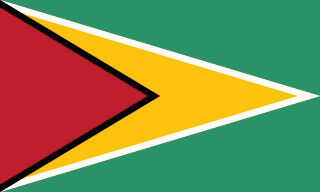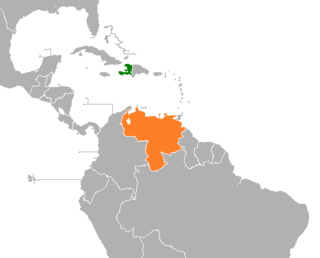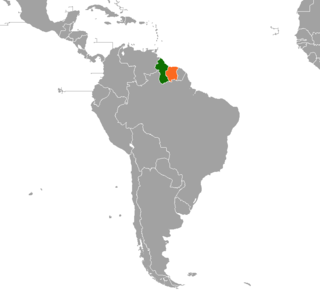 | |
Guyana | United States |
|---|---|
Bilateral relations have been established between Guyana and the United States of America. [1]
 | |
Guyana | United States |
|---|---|
Bilateral relations have been established between Guyana and the United States of America. [1]

In the 1970s, the United States opposed the policies of Guyana; the United States ceased economic aid, prevented World Bank loans to Guyana and sided with Venezuela in the Essequibo territory dispute. [2]
U.S. policy toward Guyana seeks to develop robust, sustainable democratic institutions, laws, and political practices; support economic growth and development; and promote stability and security. During the last years of his administration, President Hoyte sought to improve relations with the United States as part of a decision to move his country toward genuine political nonalignment. Relations also were improved by Hoyte's efforts to respect human rights, invite international observers for the 1992 elections, and reform electoral laws. The United States also welcomed the Hoyte government's economic reform and efforts, which stimulated investment and growth. The 1992 democratic elections and Guyana's reaffirmation of sound economic policies and respect for human rights have benefited U.S.-Guyanese relations. Under successive PPP governments, the United States and Guyana continued to improve relations. President Cheddi Jagan was committed to democracy, adopted more free market policies, and pursued sustainable development for Guyana's environment. President Jagdeo is continuing on that course, and the United States maintains positive relations with the current government.
In an effort to combat the spread of HIV/AIDS in The Co-operative Republic of Guyana, the U.S. Centers for Disease Control and Prevention (CDC) opened an office at the U.S. Embassy in 2002. In January 2003, The Cooperative Republic of Guyana was named as one of only two countries in the Western Hemisphere to be included in President Bush's Emergency Plan for AIDS Relief. CDC, in coordination with the U.S. Agency for International Development (USAID), is administering a 5-year multimillion-dollar program of education, prevention, and treatment for those infected and affected by the disease. The Cooperative Republic of Guyana was a threshold country in the Millennium Challenge Account developmental program.
U.S. military medical and engineering teams continue to conduct training exercises in Guyana, digging wells, building schools and clinics, and providing medical treatment.
In September 2020, in a joint statement with the U.S. Secretary of State Mike Pompeo, President Irfaan Ali said the two countries would begin joint maritime patrols aimed at drug interdiction near Guyana's disputed border with crisis-stricken Venezuela. [3] The agreement came as U.S. oil major Exxon Mobil Corp, as part of a consortium with Hess Corp, ramped up crude output from Guyana's massive offshore Stabroek block, a large portion of which is in waters claimed by Venezuela. [3] Pompeo and Ali added that "greater security, greater capacity to understand your border space, what's happening inside your Exclusive Economic Zone - those are all things that give Guyana sovereignty." [4]
There is an active political party along a civil movement [5] [6] in Guyana that advocates deeper ties between the United States and Guyana, seeking to become a U.S. territory or entering its Commonwealth similar to Puerto Rico. Even possible statehood has been formulated as an ultimate goal. Citing among many other factors the Guyanese emigration to the U.S. and the close ties that have emerged from it socially and economically an official internet presence was established and has been in operation for several years providing detailed information regarding emigration and other facts concerning the current Guyanese state. [7] [8] [9]
Principal U.S. Embassy Officials include:
The U.S. Embassy in Guyana is located in Georgetown.

The politics of Guyana takes place in a framework of a representative democratic assembly-independent republic, whereby the President of Guyana is the head of government and of a multi-party system. Executive power is exercised by the President, advised by a cabinet. Legislative power is vested in both the President and the National Assembly of Guyana. The judiciary is independent of the executive and the legislature.

After independence in 1966, Guyana sought an influential role in international affairs, particularly among Third World and non-aligned nations. It served twice on the UN Security Council. Former Vice President, Deputy Prime Minister, and Attorney General Mohamed Shahabuddeen served a 9-year term on the International Court of Justice (1987–96). In June 2023, Guyana was elected as a non-permanent member to the UN Security Council. The country will serve on the Council for a period of two years, beginning in January 2024.
The history of Guyana begins about 35,000 years ago with the arrival of humans coming from Eurasia. These migrants became the Carib and Arawak tribes, who met Alonso de Ojeda's first expedition from Spain in 1499 at the Essequibo River. In the ensuing colonial era, Guyana's government was defined by the successive policies of Spanish, French, Dutch, and British settlers. During the colonial period, Guyana's economy was focused on plantation agriculture, which initially depended on slave labor. Guyana saw major slave rebellions in 1763 and 1823. Following the Slavery Abolition Act of 1833, 800,000 enslaved Africans in the Caribbean and South Africa were freed, resulting in plantations contracting indentured workers, mainly from India. Eventually, these Indians joined forces with Afro-Guyanese descendants of slaves to demand equal rights in government and society. After the Second World War, the British Empire pursued policy decolonization of its overseas territories, with independence granted to British Guiana on May 26, 1966. Following independence, Forbes Burnham of the rose to power, quickly becoming an authoritarian leader, pledging to bring socialism to Guyana. His power began to weaken following international attention brought to Guyana in wake of the Jonestown mass murder suicide in 1978.

Cheddi Berret Jagan was a Guyanese politician and dentist who was first elected Chief Minister in 1953 and later Premier of British Guiana from 1961 to 1964. He later served as President of Guyana from 1992 to his death in 1997. In 1953, he became the first person of Indian descent to be a head of government outside of the Indian subcontinent.

Samuel Rudolph Insanally was a Guyanese diplomat. He was Guyana's Permanent Representative to the United Nations from 1987 onwards and was Minister of Minister of Foreign Affairs of Guyana from 2001 to 2008.

Hugh Desmond Hoyte was a Guyanese politician who served as Prime Minister of Guyana from 1984 to 1985 and President of Guyana from 1985 until 1992.

Linden Forbes Sampson Burnham was a Guyanese politician and the leader of the Co-operative Republic of Guyana from 1964 until his death in 1985. He served as Premier of British Guiana from 1964 to 1966, Prime Minister of Guyana from 1964 to 1980 and then as the first Executive President of Guyana from 1980 to 1985. He is often regarded as a strongman who embraced his own version of socialism.

The Guyana Defence Force (GDF) is the military of Guyana, established in 1965. It has military bases across the nation. The Commander-in-Chief of the Defence Force is always the incumbent President of Guyana.

David Arthur Granger is a Guyanese former politician and retired military officer who served as the ninth president of Guyana from 2015 to 2020. A member of the People’s National Congress (PNC), he previously served as Commander of the Guyana Defence Force and as National Security Adviser from 1990 to 1992. He was leader of the Opposition in the National Assembly of Guyana from 2012 to 2015.

The Guyana–Venezuela territorial dispute is an ongoing territorial dispute between Guyana and Venezuela over the Essequibo region, also known as Esequibo or Guayana Esequiba in Spanish, a 159,500 km2 (61,600 sq mi) area west of the Essequibo River. The territory, excluding the Venezuelan-controlled Ankoko Island, is controlled by Guyana as part of six of its regions, based on the 1899 Paris Arbitral Award, but is also claimed by Venezuela as the Guayana Esequiba State. The boundary dispute was inherited from the colonial powers and has persisted following the independence of Venezuela and Guyana.

Brazil–Guyana relations have traditionally been close. Brazil has provided military assistance to Guyana in the form of warfare training and logistics. Bilateral relations between the countries have recently increased, as a result of Brazil's new South–South foreign policy aimed to strengthen South American integration.

The following outline is provided as an overview of and topical guide to Guyana:

Guyana, officially the Co-operative Republic of Guyana, is a country on the northern mainland of South America. Guyana is an indigenous word which means "Land of Many Waters". The capital city is Georgetown. Guyana is bordered by the Atlantic Ocean to the north, Brazil to the south and southwest, Venezuela to the west, and Suriname to the east. With a land area of 215,000 km2 (83,000 sq mi), Guyana is the third-smallest sovereign state by area in mainland South America after Uruguay and Suriname, and is the second-least populous sovereign state in South America after Suriname; it is also one of the least densely populated countries on Earth. It has a wide variety of natural habitats and very high biodiversity.

Barbados–Guyana relations refers to the current and historical relationship between Barbados and Guyana. The former maintains non-resident diplomatic representation from Bridgetown, while Guyana which prior had a High Commissioner to Barbados appointed its first resident Consul-General, Michael Brotherson to Bridgetown in January 2012.

The Constitution of Guyana is the highest governing document in the Republic of Guyana. It came into effect on October 6, 1980, replacing the constitution enacted in 1966 upon its independence from the United Kingdom. The current Constitution of Guyana contains 12 chapters that are further divided into 232 articles. It also contains a preamble and an oath. Since its 1980 enactment, it has gone through multiple amendments.

Guyana–Venezuela relations include diplomatic, economic and other interactions between the neighboring countries of the Co-operative Republic of Guyana and the Bolivarian Republic of Venezuela.

Haiti–Venezuela relations are relations between Haiti and Venezuela. Venezuela has an embassy in Port-au-Prince, and Haiti has an embassy in Caracas.

Guyana – Suriname relations are the bilateral relations between Guyana and Suriname. Suriname has an embassy in Georgetown. Guyana has an embassy in Paramaribo. The Courentyne River makes up most of the border between the two countries.

D. Brent Hardt is an American career Senior Foreign Service Officer and present Consul General at the U.S. Consulate in Vancouver, B.C., Canada who served in the Western Hemisphere, Europe, and in Political-Military assignments. From 2011-2014 he served as U.S. Ambassador Extraordinary and Plenipotentiary to the Cooperative Republic of Guyana and Plenipotentiary Representative of the United States to the Caribbean Community (CARICOM). He most recently served as Chargé d'Affaires ad interim at the U.S. Embassy in Paris, France beginning in August 2017. Prior to his arrival in Paris, he served as Foreign Policy Advisor to the Commander of U.S. Central Command and as Foreign Policy Advisor to the Commander of U.S. Special Operations Command. Other assignments include service as Chargé d’Affaires at the U.S. Embassy to Barbados and the Eastern Caribbean from 2009-2011, and Deputy Chief of Mission and Chargé d’Affaires at U.S. Embassies in The Bahamas (2005-2008) and the Holy See in Rome (2002-2005).

Mohamed Irfaan Ali is a Guyanese politician serving as the tenth and current president of Guyana since 2020. A member of the People's Progressive Party/Civic (PPP/C), he previously served as the minister of Housing and Water from 2009 to 2015. He is the first Muslim to hold office, and is the second Muslim head of state in the Americas after Noor Hassanali of Trinidad and Tobago.
Washington never sought to remove Forbes Burnham from power, despite frequent vexations with his policies. ... However, because of its displeasure with numerous Guyanese policies during the decade, the United States applied pressure in various ways: it suspended economic and food aid, it blocked World Bank loans, and it appeared to side with Venezuela in the ongoing territorial dispute. The October 1976 bombing of Cubana Airlines flight 455, in which eleven Guyanese, five North Koreans and fifty-seven Cubans were killed, was widely seen as retaliation for Guyana and Cuba's coordinated involvement in Angola.
![]() This article incorporates public domain material from U.S. Bilateral Relations Fact Sheets. United States Department of State.
This article incorporates public domain material from U.S. Bilateral Relations Fact Sheets. United States Department of State.